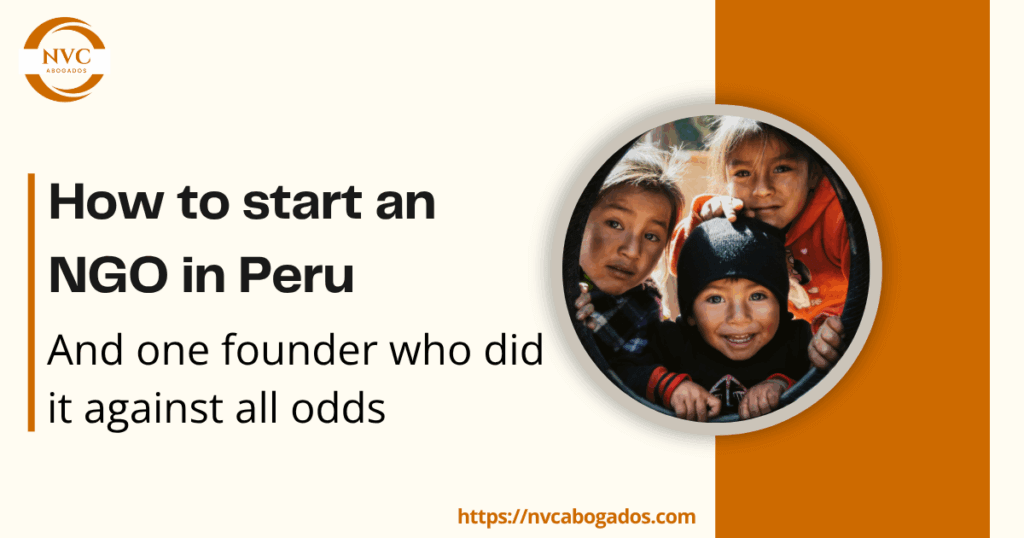Peru is a country of contrast: rich in culture, stable in politics, but still deeply affected by poverty, especially in the Andes and the Amazon region. Many foreigners see this — and decide to take action. Some come to volunteer, others go further: they want to start their own NGO.
If you’re one of them, here’s what you need to know.
Legal Structures: Asociación Civil vs. Foundation
Peruvian law recognizes two main types of non-profit organizations:
Asociación Civil (Civil Association):
The most common and flexible structure, ideal for grassroots projects.Foundation:
Less common and harder to set up, with stricter legal and financial requirements.
Both can receive local and international donations, and both can apply for tax benefits — but only if the registration process is done correctly.
What Does the Process Involve?
Setting up an NGO in Peru is not overly expensive, but it does involve multiple steps and some patience. Here’s what we do for our clients:
✅ Draft and notarize the founding documents
✅ Register the NGO with SUNARP (the national registry)
✅ Obtain the RUC (Peruvian tax number)
✅ Ensure eligibility for tax exemptions
✅ Create legal agreements (in Spanish or English) with partners and donors
✅ Advise on visa options for founders or staff
✅ Provide ongoing accounting and compliance services
This process usually takes a few months — but it can be done even if you’re still abroad. One inspiring example is Jempstar Peru, founded by our American client Truman Moore who was still in the US when we finalized the registration and is now a permanent resident in Peru.
A Real-Life Example: Jempstar Peru
Jempstar Peru started as a personal dream: offering free English education to children in a rural Andean community. What began with one man and a vision is now a legally recognized NGO with donation benefits and a clear legal structure.
Even during the pandemic, with borders closed and partners stuck in different cities, we managed to complete the full registration and prepare everything for Truman’s arrival in Peru. Today, he is a legal resident, fully focused on his project.
His case is a reminder that building something meaningful is always possible — even under the toughest circumstances.
What About Visas?
There is no specific visa for NGO founders or volunteers in Peru. However, we help our clients navigate these options:
Work Visa as CEO of the NGO:
This is the best option for founders who want to stay long-term and manage the organization legally.Tourist Visas for short-term volunteers:
Often used in practice, but they do not legally allow volunteering and come with risks.Cooperante Visa:
Reserved for large, internationally recognized organizations — usually not available for small grassroots NGOs.
We always recommend planning this part carefully. Immigration law in Peru can be tricky, and the wrong visa can jeopardize your project.
Ongoing Support
At NVC Abogados, we don’t just register your NGO and walk away. We provide:
Monthly accounting and tax filings
Legal compliance services
Custom contracts with donors or partners
Help with audits and yearly reports
Translation of legal documents and agreements
Is It Worth It?
Starting an NGO in Peru is a commitment. It takes time, coordination, and a clear strategy. But if your goal is to create long-term impact, it’s the only way to do things right.
Jempstar Peru is proof that it’s possible. Even in the middle of a global pandemic. Even when you’re thousands of miles away. All you need is the right guidance — and the determination to follow through.

Planning to start or manage an NGO in Peru?
Registering and running a non-profit in Peru comes with specific legal, tax, and reporting requirements. Getting it wrong can block funding or lead to sanctions.
Book your private consultation with Sergio Vargas to understand the full legal framework and avoid common pitfalls when working in the non-profit sector.
The session takes place via Zoom and can be conducted in English or Spanish.
Don’t miss out on important updates!
Subscribe to our Substack newsletter and get the latest articles on immigration, taxes, and real estate in Peru delivered straight to your inbox.

